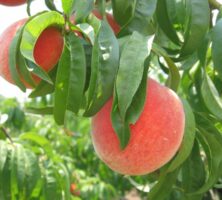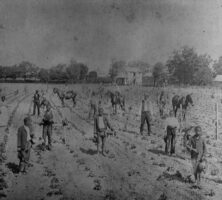The county seat of Peach County, Fort Valley was founded in the 1820s as a Native American trading post and incorporated in 1856.
Its economy has long been based on agriculture. Located in central Georgia, Fort Valley is fifty-eight miles from the Alabama state line and ninety miles due south of Atlanta. It is located at the intersection of U.S. Highway 341 and Georgia Highways 96 and 49, where two early Indian trails met. That crossing of trails made it a natural place for a North Carolinian named James Abbington Everett to set up a trading post in the 1820s. The origin of the town’s name is unclear. One story claims that Everett named it “Fox Valley” but that his writing was misread by officials in Washington, D.C., as “Fort Valley.” Another story claims that Everett named the town after his friend Arthur Fort, a Revolutionary War (1775-83) hero from nearby Milledgeville. In any case, it seems that there was never a military fort on the site.

Everett became a wealthy and influential plantation owner, donating funds for the education of Georgians and using his influence to ensure that the railroad came through town. The railroad played a key role in the town’s development. When Fort Valley was officially chartered in 1856, the town limits were established as one mile in each direction from the railroad depot. Outside the one-mile radius large plantations grew up, devoted at first to cotton and later to peaches, asparagus, and pecans. The development of the Elberta peach and excellent rail connections taking the fresh fruit great distances combined to make Fort Valley the peach-growing center of Georgia. The area’s identification with the fruit was so great that in 1924 a new county, Peach, was carved out of sections of Macon and Houston counties, with Fort Valley as its seat.
Along with the agricultural economy came a demand for chemical fertilizers and pesticides. In 1920 a manufacturer of agricultural chemicals built a plant in what is now downtown Fort Valley to fill the demand. During the following decades the plant changed hands several times. In the 1980s the Environmental Protection Agency discovered that the ground around the plant was contaminated by lead, arsenic, and other chemicals, and steps were taken to correct environmental damage sustained by the area.
As with many other American agricultural communities, Fort Valley has been through a period of economic retrenchment. Remarkable for the amount of private funding it has been able to attract to its downtown renewal projects, the town has relied on government resources for less than 15 percent of its funding for a major redevelopment and revitalization effort. Central to Fort Valley’s resurgence is Fort Valley State University, a historically Black college and one of the area’s largest employers. Another of the area’s largest employers, Blue Bird Corporation, was founded in Fort Valley in 1927 and still has a manufacturing facility in town

The Peach Festival, held in Fort Valley and Byron every June, is the product of effort by nearly every resident, with attendance from outside the area growing yearly. As the economy has moved away from heavy dependence on agriculture, residents have found employment in local textile plants, organic pesticide manufacturing, the Blue Bird bus factory, a budding tourist economy, and the university. Fort Valley was chosen as one of the Georgia Municipal Association’s Cities of Excellence for 2003.
Notable residents of Fort Valley have included the writer Judson Mitcham, singer Lena Horne, educator Horace Mann Bond, politican Julian Bond, and civil rights leader A. T. Walden.
According to the 2020 U.S. census, Fort Valley’s population was 8,780.













